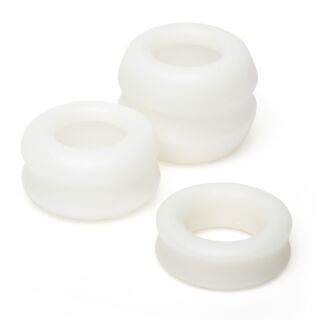Debunking sex myths and common misconceptions with Lovehoney

When it comes to sex, there are many common myths and misconceptions. You might have multiple questions surrounding sex and sexual health, like whether men want sex more than women, and if sex before sport affects performance. You might also wonder if you can get an STD from a toilet seat.
With multiple misconceptions about sex, it’s tricky knowing what to believe! You might have questions about how you catch a sexually transmitted disease (STD) and how to protect yourself.
This guide will investigate the myths when it comes to sex, so you can enjoy your sex life without worry…
12 of the most common misconceptions about sex and sexual health
Myth 1: You can’t use condoms if you’re allergic to latex
If you’re allergic to latex, it doesn’t mean you can’t use a condom. That’s false information!
If you’re allergic to latex, don’t worry. There are latex-free condoms available to buy. A latex-free condom is a great way to protect yourself if you’re allergic, and condoms without latex can be used by anyone.
Condoms are one of the most effective methods of contraception. They are affordable, easy to use and reliable. You’ll know which condom works best for you after trying them out.
Myth 2: Does the “pull-out” method work?
The pull-out method is not a reliable method of contraception. How effective the “pull-out” method is depends on your partner.
Even if your partner pulls out on time, there’s still a risk of pregnancy. This is because pre-ejaculate fluid containing sperm has the ability to enter your body and lead to pregnancy.
It can also be difficult for your sexual partner to get the timing right, making it a gamble. If you suspect that the method hasn’t worked then it’s a good idea to use emergency contraception.
Myth 3: Contraception is the woman’s responsibility
False! Men and women often get into debates about whose responsibility contraception is. Contraception is the responsibility of both partners. Yes, a woman can take the pill and choose other methods of contraception, however, a man also has options.
Fewer options are available for men. They can either choose to wear a condom or opt for a vasectomy. A vasectomy is a permanent option, so it’s something that would need to be considered carefully.
Myth 4: Does your first time always hurt?
Your first time having sex doesn’t always hurt. Yes, it can be painful for some women the first time they have sex, but this isn’t the case for everyone.
If you do experience pain the first time you have sex, it’s likely a result of breaking your hymen. In some cases, painful sex could be caused by an underlying issue.
Vaginal or anal sex can sometimes hurt if you’re not used to it or prepared. Using lubrication can help to ease the friction and make sex more enjoyable.
Sometimes a size difference can get in the way of intimacy. A penis bumper set can help when worn on the penis or used with an insertable toy. These stretchy bumpers help to reduce the depth of penetration, so you can concentrate on each other.
Designed to help the wearer feel uninhibited, these bumpers help limit the depth of penetration, allowing their partner to relax and enjoy the moment. They're especially helpful for couples where one partner may find their partner's maximum length a little uncomfortable.
Myth 5: Oral sex is safe
This is incorrect. Oral sex without protection can put you at a high risk of transmission when it comes to STDs.
If your partner has oral herpes and they perform oral sex, it can lead to you contracting genital herpes. It can spread from your partner’s mouth to your genitals during oral sex.[1]
To be safe when you’re having oral sex, you should consider using protection to minimise the risk of contracting an oral STI.

Myth 6: Condoms = safe sex
Although highly effective, condoms don’t necessarily mean safe sex. But why are condoms not 100 percent effective?
If a condom is used correctly, it’s 98% effective at preventing pregnancy. When used incorrectly, they’re 82% effective. [2]
They should always be used to minimise the risk of catching an STD, even when you’re having oral sex. If you’re having skin-to-skin contact with an infected person, be sure to use a condom.
Myth 7: HIV can be spread through any bodily fluid
Not all bodily fluids spread HIV. Some don’t contain enough HIV to spread the virus such as sweat, saliva and tears.
So, if you can’t get HIV through all bodily fluids, how do you get HIV? How HIV is transmitted has been a topic of discussion for years. HIV can be spread through blood, semen, vaginal secretions, rectal fluids and blood.
The safest way to prevent spreading HIV when having sex or oral sex is by using a condom correctly.
Myth 8: Can you get an STD from a toilet seat?
It is extremely rare to get an STD from a toilet seat. If you have heard that you can get chlamydia from a toilet seat, this is incorrect. You can’t catch herpes from a toilet seat, either. Using a public bathroom does not put you at risk of an STD and you can't catch and STD from a toilet seat.
STDs are caused by viruses, bacteria and parasites. These organisms can’t live or thrive on hard surfaces, including toilet seats!
In some cases, there might be an exception to the rule. A damp toilet seat can spread trichomoniasis, however, and it would need to be freshly deposited and come into direct contact with your genital area.
Hepatitis B can also enter your body from a toilet seat, but again, this would need to be freshly deposited and come into contact with an open wound.
So remember, catching an STD from a toilet seat is incredibly rare and almost impossible.

Myth 9: Are oysters and chocolate natural stimulants?
There’s no real evidence to suggest that oysters and chocolate are natural stimulants. However, they’re both known to be natural aphrodisiacs.
They might be able to increase blood flow, strengthen the walls of your blood vessels and balance your hormones.
Chocolate has also been known to increase libido (sex drive) by promoting the release of certain chemicals such as phenylethylamine and serotonin in your body. Sexually enhancing chocolate has become more popular due to the belief that dark chocolate has benefits sexually.
Myth 10: Sex toys aren’t as good as the real thing
Some people might argue that sex toys aren’t as good as the real thing, but with a whole range of new toys on the market, that’s up for debate!
Sex toys are easy to use, easy to clean and are perfect for when you want some alone time without anyone else or equally, if you are looking to try something new with your partner. Sex toys are available for all genders and body types to help them meet their sexual desires.
For men, you might be interested in a personal stroker or a love ring to take your masturbation to the next level.
Women typically opt for a vibrator. There are different types that offer external stimulation (for the clitoris or other sensitive areas such as the nipples), internal stimulation for use inside the vagina, targeting an area known as the G-Spot which becomes engorged and more responsive to stimulation when aroused and others like Rabbit Vibrators, which target internal and external areas simultaneously.
Using a vibrator or other sex toys can be just as enjoyable as sex, if not even more enjoyable.
Myth 11: Does sex affect athletic performance?
Sex can affect athletic performance. Higher testosterone levels have benefits for both men and women when it comes to many sports, and it can also enhance your athletic performance. Having sex regularly is healthy and can lead to higher testosterone levels.
However, the timing of sex before a sporting event can matter. If sex happens right before an event then it could be harmful to the performance.
Sexual activity throughout training is thought to promote relaxation and positively affect your performance.
On the other hand, it can depend on the sport you are taking part in. Sometimes, sex can have a negative impact on your performance.
Myth 12: Men want sex more than women
It has been argued that men have a higher sex drive than women, however, this is not always the case. Sexual interest is driven by many factors for both men and women.
In a recent study, it was discovered that men were just as likely as women to be the partner with a lower sex drive.
How can I communicate these myths with my partner?
Sex requires communication. If you or your partner have any worries about sex, you must talk to one another.
Discussing the myths surrounding sex is useful for both of you. When it comes to talking about sex myths, you should speak to your partner to discuss whether or not something is true or false before you have sexual intercourse; this is important if either of you have any concerns.

Don’t let false information about sex spread - get to know the facts! Being educated on sex can help you make informed decisions.
We hope this guide has given you a better understanding surrounding sex myths, but if you need more information you can look at some of our other sexual health guides or visit the NHS website.






